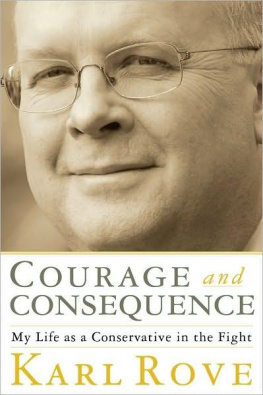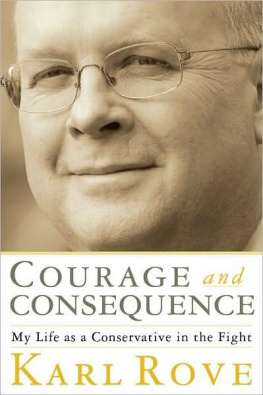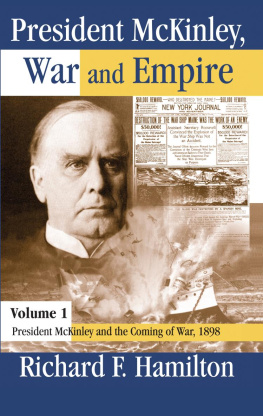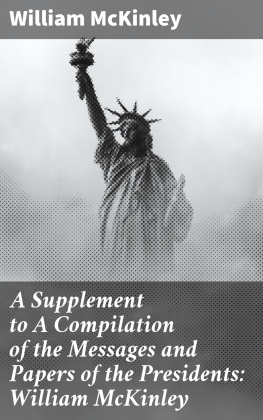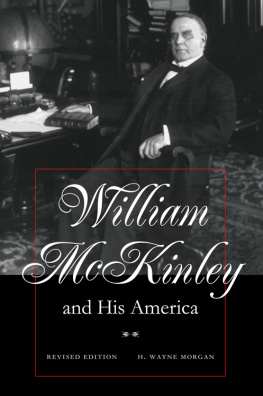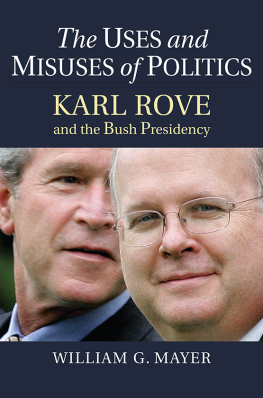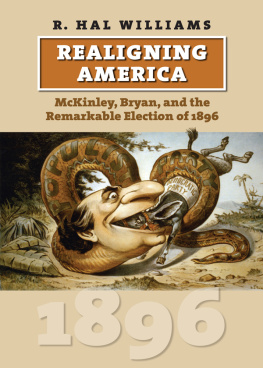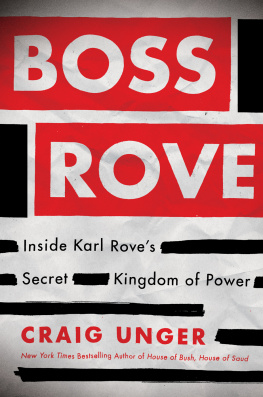Karl Rove - The Triumph of William McKinley: Why the Election of 1896 Still Matters
Here you can read online Karl Rove - The Triumph of William McKinley: Why the Election of 1896 Still Matters full text of the book (entire story) in english for free. Download pdf and epub, get meaning, cover and reviews about this ebook. year: 2015, publisher: Simon & Schuster, genre: Politics. Description of the work, (preface) as well as reviews are available. Best literature library LitArk.com created for fans of good reading and offers a wide selection of genres:
Romance novel
Science fiction
Adventure
Detective
Science
History
Home and family
Prose
Art
Politics
Computer
Non-fiction
Religion
Business
Children
Humor
Choose a favorite category and find really read worthwhile books. Enjoy immersion in the world of imagination, feel the emotions of the characters or learn something new for yourself, make an fascinating discovery.

The Triumph of William McKinley: Why the Election of 1896 Still Matters: summary, description and annotation
We offer to read an annotation, description, summary or preface (depends on what the author of the book "The Triumph of William McKinley: Why the Election of 1896 Still Matters" wrote himself). If you haven't found the necessary information about the book — write in the comments, we will try to find it.
Karl Rove: author's other books
Who wrote The Triumph of William McKinley: Why the Election of 1896 Still Matters? Find out the surname, the name of the author of the book and a list of all author's works by series.
The Triumph of William McKinley: Why the Election of 1896 Still Matters — read online for free the complete book (whole text) full work
Below is the text of the book, divided by pages. System saving the place of the last page read, allows you to conveniently read the book "The Triumph of William McKinley: Why the Election of 1896 Still Matters" online for free, without having to search again every time where you left off. Put a bookmark, and you can go to the page where you finished reading at any time.
Font size:
Interval:
Bookmark:

Thank you for downloading this Simon & Schuster eBook.
Join our mailing list and get updates on new releases, deals, bonus content and other great books from Simon & Schuster.
C LICK H ERE T O S IGN U P
or visit us online to sign up at
eBookNews.SimonandSchuster.com

To the Modern McKinley Men:
H. Wayne Morgan
Lewis L. Gould
R. Hal Williams
Charles W. Calhoun

O n July 24, 1864, a twenty-one-year-old Union first lieutenant was sent on a suicide mission near Kernstown, Virginia. An officer in General George Crooks Army of the Kanawha, he was ordered to ride across an exposed battlefield swept by Rebel musket and artillery fire and tell the men of the 13th West Virginia to withdraw before they were overrun and cut to pieces by Confederates under General Jubal Early, who were close to splitting the Union left.
If the Rebels succeeded in driving Union forces out of the Shenandoah Valley, they might threaten Washington, D.C., further erode Northern support for the war, undercut Lincolns reelection, and strengthen the Souths chances of ending the conflict through a negotiated settlement with a politically divided North.
The lieutenant probably wasnt concerned about these details as he mounted his horse. He was focused on staying alive. Comrades saw him charge through the open fields, over fences, over ditches as cannon fire and bullets sprayed the battleground. His tent mate thought he had been hit by an exploding shell, but a wiry little brown horse emerged from the smoke with its rider erect and unhurt. He reached the West Virginians and ordered them to withdraw.
The lieutenant, William McKinley Jr., was to become the twenty-fifth president of the United States. Upon returning from his ride, his commanding officerColonel Rutherford B. Hayes, himself a future president from Ohiosaid, I never expected to see you in life again.
SOME HISTORIANS WRONGLY CREDIT McKinleys winning the White House in 1896 to Marcus Alonzo Mark Hanna, a wealthy iron and coal magnate turned political power broker. Others are content to overlook McKinley, instead spotlighting his second vice president and successor, Theodore Roosevelt.
Yet in 1896 McKinley outmaneuvered the political bosses within his own party to win the Republican nomination and then defeated the Democrats young, charismatic spokesman for the rising Populist movementWilliam Jennings Bryanfor the presidency. In the process, McKinley modernized the Republican Party by attracting to it workers, new immigrants, and the growing middle class, allowing the GOP and its policies to dominate politics for the next thirty-six years.
McKinley was the first president in more than two decades to win with a significant popular majority. He took office during a severe, prolonged depression that was quickly replaced by strong growth and prosperity on his watch. He annexed Hawaii and waged a short, successful war with Spain that freed Cuba and gave America control of the Philippines, Puerto Rico, and Guam. He instituted policies that ensured America would be recognized as a global economic and military power. Enormously popular, he was easily reelected, only to die at an assassins hands six months into his second term.
For much of the nineteenth century, the United States had been a nation divided. The period after the Civil War saw growing discord between the agrarian South and West and the industrialized North and East. There was friction between debtors worried about their mortgages and loans and the merchants, bankers, investors, and depositors who had lent them the money. There was increasing antagonism between labor and management, and profound disagreements over how the economy should be organized and its benefits distributed. All this was reflected in brutal political battles over esoteric issues like tariffs and currency that nonetheless deeply affected the lives of ordinary people.
In many ways, these clashes werent about economicsthey were about competing visions for America. Through the nineteenth century, the United States filled the frontier with settlers and established firm control over the continent. Yet these pioneers were rocked by periodic financial
In 1896, McKinley emerged as a political leader uniquely suited for the moment. He understood and championed blue-collar voters while drawing support from captains of industry. He was from a small town in rural Ohio, but as president presided over a rapidly modernizing urban industrial power. His economic concerns appeared parochial, but he viewed them through a national lens. The last of the Civil War generation to occupy the White House, he helped unite the country after decades of division.
A SHADOW HAS BEEN cast on McKinleys reputation by a remark he made that he learned more from people than from books. Though he was well read and well educated, biographers still assumed the throwaway line justified a narrative that William McKinley was not particularly thoughtful or intellectually curious. Yet his election is widely seen as one of the most consequential in American history, leading to a dramatic political realignment.
So was McKinley a fortunate man who rose through luck and the guidance of others, as popular commentary suggests? Or was he a leader, very much in control of his own destiny, content to steer quietly but deliberately, focused on reaching goals more than on claiming credit?
In fact, McKinley was a principled man with strong convictions. He was ambitiousmost who attain the White House arebut for him, his ambition seems to have been chiefly driven by principles.
Understanding McKinley starts with knowing his forebears, who sprang from Scotland, moved to Ireland, and then came to America, taking up residence in Pennsylvania and, finally, Niles, Ohio, where the future president was born January 29, 1843, the seventh of nine children.
The Scotch-Irish made an impact on America that far outweighs their
Hannawho had a more mangled yet somewhat similar lineageonce said McKinley received all the Scottish reticence of their shared heritage, while he got all the Irishmans gregariousness. There was something to the remark. Hanna enjoyed politics jocular side, while McKinley remained personally reserved from childhood to the White House.
Reserved shouldnt imply disengaged. The wife of McKinleys principal Ohio political rival once said he was a man who wore many masks, making it hard to read his emotions or intentions. McKinleys reserved nature wasnt just artifice. It was the deliberate approach of a disciplined man who went about his business in a systematic way. He didnt let his emotions cloud sound decision making or affect his relations with others.
McKinleys parents were Methodists and held a deep faith common on the frontier. His father was especially religious, writing his then-forty-one-year-old son in 1884 upon hearing of a family medical crisis to ask, Is your faith strong[?] Reserved like his son, Father McKinley was a frugal hard worker with a reputation for integrity. While not well educated, the elder McKinley nonetheless read widely and was fond of reciting favorite lines from a prized volume of Shakespeare.
Young William was close to both his parentsespecially his mother, as his father was often away on business. Nancy Allison McKinley descended from Puritans who fled Old World religious persecution and helped William Penn found Pennsylvania. In the New World, her ancestors maintained their faiths quiet intensity. Nancy had charge of the Niles Methodist church, keeping it clean and well maintained as if it were her home. A neighbor remembered she ran the church, all but the preaching. Mother McKinley (as she became known) tended to ailing friends and boarded traveling ministers and teachers in the familys home. She also served as the small towns peacemaker, resolving quarrels and neighborhood disputes.
Font size:
Interval:
Bookmark:
Similar books «The Triumph of William McKinley: Why the Election of 1896 Still Matters»
Look at similar books to The Triumph of William McKinley: Why the Election of 1896 Still Matters. We have selected literature similar in name and meaning in the hope of providing readers with more options to find new, interesting, not yet read works.
Discussion, reviews of the book The Triumph of William McKinley: Why the Election of 1896 Still Matters and just readers' own opinions. Leave your comments, write what you think about the work, its meaning or the main characters. Specify what exactly you liked and what you didn't like, and why you think so.

